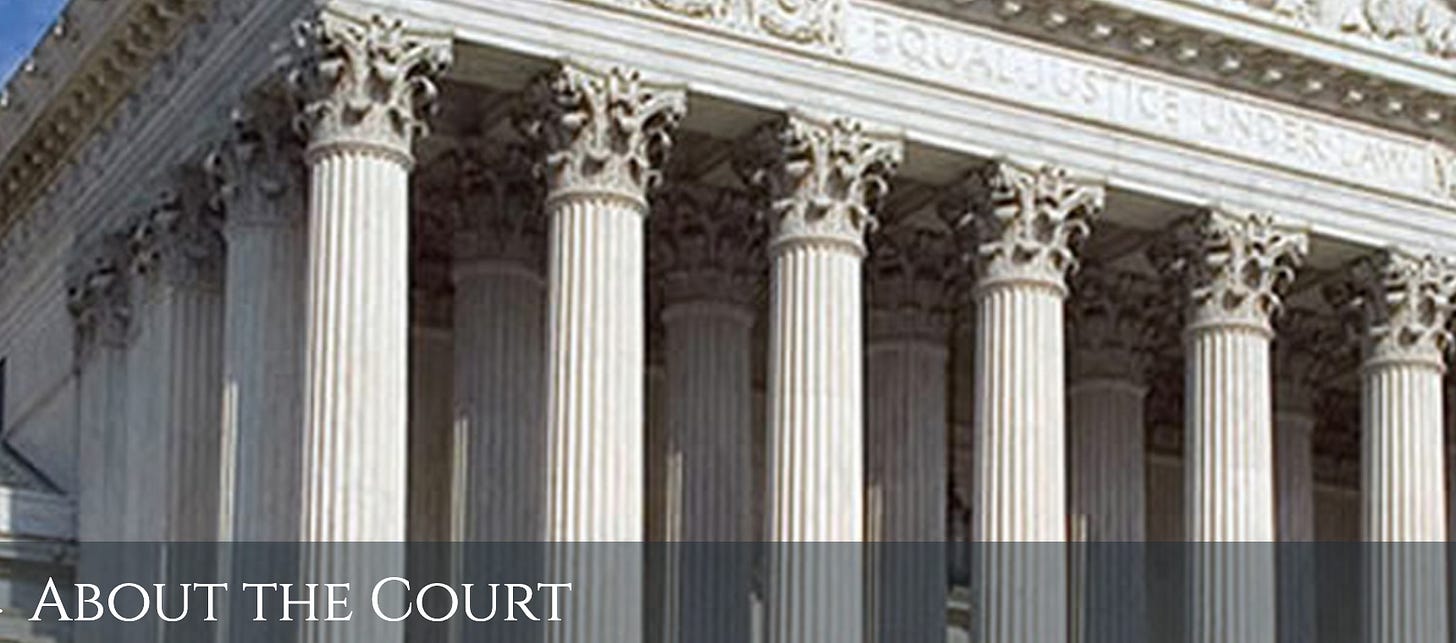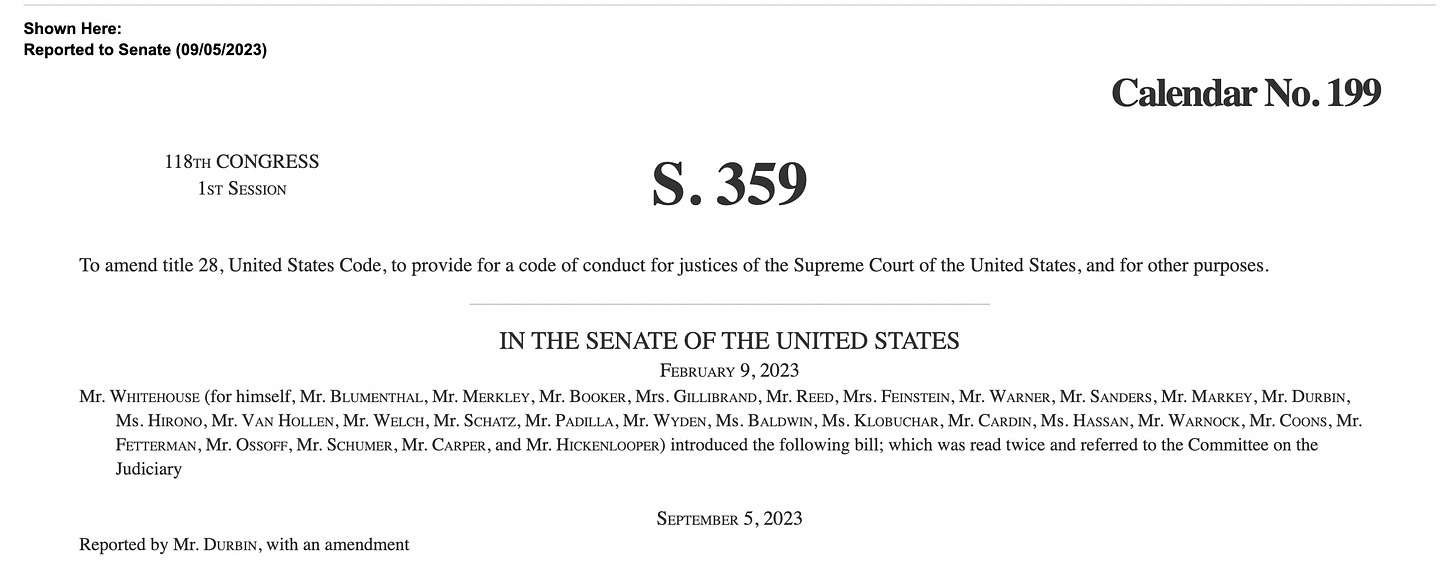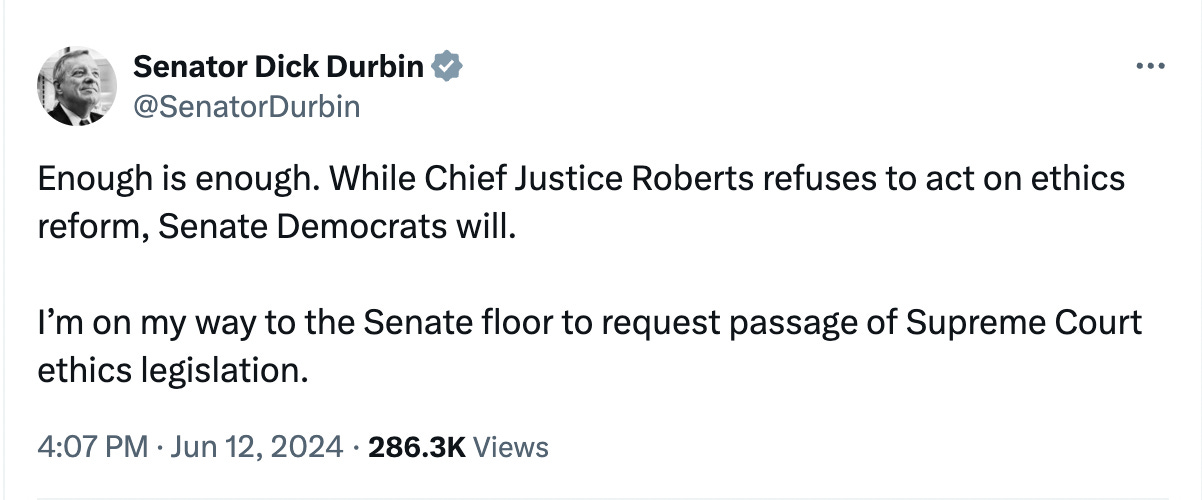About the Court: SCOTUS Ethics
There is a move on to bring ethics to the Supreme Court. Not to overstate the problem, because to be fair, aside from recent reports that Justice Clarence Thomas received as much as $4 million in gifts from new friends he made after his confirmation (Justice Jackson got Beyonce tickets valued at just over $3,700, but she reported them and will presumably recuse if any litigation about the BeyHive comes before the Court, just like she did when her alma mater, Harvard, was a party in one of last term’s affirmative action cases) and that Justice Alito is committed to restoring “godliness” to our great Christian nation, everything else is just fine.
The Supreme Court's ethics issues are finally getting the attention they deserve, and not a minute too soon.
Unlike the rest of the federal judiciary, the Code of Conduct for Federal Judges, which applies to federal judges on the lower courts, doesn’t apply to Supreme Court Justices. Federal law does require the Justices to report income, debts, land sales and purchases, and gifts, among other things. However, in the past, some of the Justices used a loophole known as the “personal hospitality clause” to avoid disclosures that could be important to litigants trying to assess whether a justice has a conflict of interest. The loophole removes the reporting requirement when food, lodging, or entertainment is “received as personal hospitality of an individual,” and some of the Justices interpreted it very broadly. In practice, we saw documentation in the ProPublica reporting and elsewhere of lots of relevant but unreported gifts to some of the Justices from people with an interest in the outcome of cases before the Court.
On November 13, 2023, following widespread media coverage of the ethical issues, the Court adopted a non-binding Code of Conduct for Supreme Court Justices. But the fact that it’s not binding and can’t be enforced even if a justice flagrantly violates the rules makes the entire exercise an empty one.
Why isn’t there an ethics code imposed by an outside body, like Congress? Some people have suggested doing so would violate the separation of powers. That could be a practical concern, since the Court is charged with ruling on the legality of measures passed by Congress, it could overrule, on separation of power or other grounds, any strictures on its behavior adopted by Congress. But Congress already plays a role in regulating the Court. It requires them to take an oath of office. It sets their compensation and retirement eligibility.
Martha Kinsella, a senior counsel at the Brennan Center, explained last year as the subject of Congress regulating the Court surfaced following allegations of ethical impropriety, that “Congress’s mandate to ‘make all Laws which shall be necessary and proper for carrying into Execution [its enumerated] Powers, and all other Powers vested by this Constitution in the Government of the United States’ implicitly grants Congress the authority to enact a wide range of legislation to facilitate the exercise of judicial power. This includes ethics legislation, which safeguards the legitimacy of the Court by protecting the quality of its decision-making. Moreover, Congress has the ultimate power to impeach and remove justices for bad behavior, which justifies regulation to ensure good behavior.”
Senate Democrats agree. Last summer, Rhode Island Senator Sheldon Whitehouse proposed a measure that would have required a code of conduct for the Supreme Court. Hearings took place, but the bill stalled and never made it to a vote.
Today, there was a new proposal, legislation that, if passed, would impose new reporting rules and establish a process for filing ethics complaints against Justices. Any complaints would be resolved by a board of federal appeals court judges. Democrats tried to put the bill on a fast track to adoption, but of course, Senate Republicans blocked it.
The Republicans claimed the bill was partisan politics. Senate Judiciary Committee Democrats took to Twitter to respond: “No, an enforceable code of conduct for Supreme Court justices is not a partisan exercise. Quite the opposite. It would apply to *every* Supreme Court justice, regardless of who appointed them.” But that wasn’t enough for South Carolina Senator Lindsey Graham, who objected to taking up the bill. He said, “Let’s be clear: This is not about improving the court, this is about undermining the court,” before calling the measure “an unconstitutional overreach,” claiming it “would undermine the court’s ability to operate effectively.”
The Democratic effort to get unanimous consent on the Supreme Court ethics bill was doomed from the start. Democrats understood they would not receive sufficient Republican support for the measure to pass today. But they also understood it was important to begin taking steps toward passing a measure that “would require Supreme Court justices to adopt a binding code of conduct, create a mechanism to investigate alleged violations of the code of conduct … improve disclosure and transparency when a justice has a connection to a party or amicus before the Court,” as Illinois Senator Dick Durbin put it.
Senator Whitehouse, who sponsored this follow-on effort to his work last summer, tweeted: “I’m not surprised. Republicans just shot down an effort to pass my Supreme Court Ethics, Recusal, and Transparency Act. The highest court shouldn’t have the lowest ethics standards. What’s controversial about that?”
Even though unsuccessful, today’s work in the Senate was important work. It’s a good start. Sometimes, you’ve got to build a runway before you can take off. Senator Durbin, in particular, blamed Republicans who blocked the SCERT Act from clearing the Senate in pointed terms any voter can understand. “They’d rather have a Supreme Court riddled with ethical lapses than institute a binding code that applies to every justice.” he wrote on Twitter. He also tweeted, “Chief Justice Roberts repeatedly refuses to use his authority and power to implement a binding code of conduct for the Supreme Court. Until he does, Congress will continue our legislative efforts.”
Democrats tried to pass a bill that would address some of the clear abuses we’ve seen on the Court. The Court doesn’t sit above the rest of the government; it is a separate but equal branch of government and must be subject to the same constraints in the form of legitimate checks and balances as other branches. Republicans, without addressing any of those abuses, labeled it partisan and blocked it.
Now, there has to be accountability. We can help support the work Democratic Senators did today by keeping this issue on the front burner. Let’s be loud about the fact that the Court is on the ballot. And it’s important to note, as Senate Democrats did, that this is not a partisan issue. Ethics reform applies to all Justices equally, no matter who appointed them. Isn’t that what we all want? A fair and impartial high court deciding the most important cases in the nation?
A number of folks have asked whether the Chief Justice can do anything about this. The answer is no, if we’re talking about forcing any of his brethren or sistren to abide by certain reporting rules or recuse from specific cases. His role as Chief is largely ceremonial and administrative. The Chief Justice presides over the public sessions and private conferences, where the Justices decide what cases they will take and how they will vote on them. He assigns opinion when he is in the majority, but doesn’t have the authority to order the professional lives of his colleagues, all of whom are presidentially nominated and Senate confirmed just like he is.
However, the Chief Justice does have a bully pulpit he can use with them, as Chief Justices have done in the past. Either Chief Justice Roberts has not, or his efforts have fallen on deaf ears. We do not know. The ivory tower of the Court is opaque.
The role of the Chief Justice is mentioned only one time in the Constitution, and that happens in Article I, which is about the powers of Congress, not in Article III, which establishes the judiciary. Article I requires the Chief Justice to preside if a president is impeached in the Senate.
If you want to read more about the duties of the Chief Justice, this report from the Congressional Research Service (CRS) is an excellent primer. CRS is a federal legislative branch agency located within the Library of Congress that works for Congress, producing comprehensive and nonpartisan reports on a broad swath of topics of interest to legislators.
Despite the Chief Justice’s lack of formal power, there is no reason he and other like-minded members of the Court can’t bring the force of reason to bear on other Justices. There are no armies that go out and enforce the Court’s decisions. They hold sway because the public has confidence they act as neutral umpires on difficult issues and when that confidence lags, as it is in this moment, the balance in our government is impaired.
Justices who love the rule of law and believe in the future of the country have a duty to restore the institution they serve in. Perhaps it’s time for those who would violate those rules to retire. Instead of fighting for their right to continue to party at Harlan Crow’s expense, Justices should be embracing measures to restore the Court’s integrity.
But given the failure of the Court to successfully police its own, it’s clear that the time for Congressional action is ripe. So take a few moments to thank the leaders who are beginning this work, even if they aren’t your own representatives. And remember, the Court will be on the ballot if we insist it must be. We all should.
Tomorrow, Thursday, and again on Friday of this week, the Supreme Court will announce decisions in its remaining cases. There will be more next week and so on until all of the cases are out, either by the end of the month or perhaps spilling over into early July. Among the remaining cases are:
Abortion cases regarding mifepristone and whether Idaho’s ban conflicts with the federal EMTALA law that requires the provision of emergency care
The Trump presidential immunity case, as well as the challenge to charges of obstruction of an official proceeding brought against January 6 rioters, where a loss for the government could mean dismissal of two of the charges against Trump in the federal election interference case
Firearms cases that will determine whether the government can continue to prosecute people subject to domestic violence restraining orders for firearms possessions or whether their Second Amendment rights trump that law, as well as whether bump stocks, which make it easier to fire rounds rapidly, can be deemed machine guns, which would make having one illegal
Cases involving social media regulation, including the challenge to Florida and Texas laws that prohibit tech firms’ self-regulation of social media content and a challenge that seeks to prevent the Biden administration from engaging with social media companies about moderating content that contains misinformation
Cases that will impact the ability of federal administration agencies to act on behalf of the American people, including Loper Bright
And more.
We’ll discuss them as they come down, but as important as the decisions themselves is the legitimacy of the Court that issues them. That means that while we focus on the opinions to come, we also need to keep in mind how important it is to demand ethics reform. The Supreme Court has demonstrated it can no longer be left to self-rule in this important regard.
We’re in this together,
Joyce





Joyce, Thank you for your blunt assessment of the ethics and lack thereof in our current Supreme Court. We'd be aghast if Alito and Thomas were powerful judges in another country and would be demanding reform. Unfortunately, as you say, the GOP likes the SCOTUS rulings - ethics be damned. And GOP leaders and funders are counting on this court to allow and implement the extreme anti-democracy plans of Project 2025.
We pro-democracy activists have our work cut out for us as we defend our democracy and protect our freedoms.
The Constitution says that the President is elected for 4 years, so he cannot be removed from office unless impeached. Judges, on the other hand, are governed by a strikingly different standard under the Constitution. They may hold their offices only "during good behaviour" (good behavior). When judges and justices commit crimes, they should be convicted without the need to impeach them. Of course, judges have said that they must be impeached and removed from office before they can be tried for a crime. But our "originalist" justices (including Justices Alito and Thomas) should have no problem complying with the plain meaning of the plain language of Article III and the guidance of the Framers such as Alexander Hamilton in The Federalist No. 78. A justice lying or concealing information in proceedings within the jurisdiction of the legislative or judicial branches commits a federal offense. 18 U.S.C. 1001.